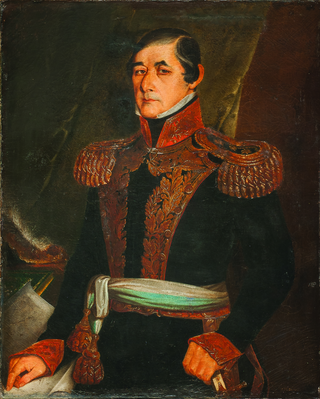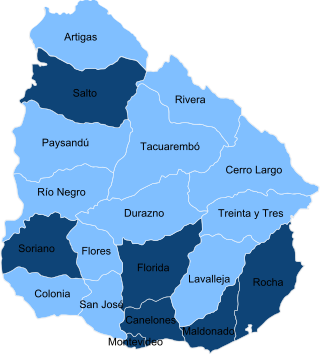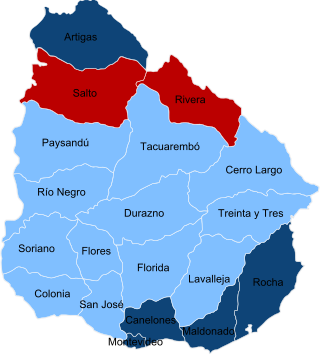The history of Uruguay comprises different periods: the pre-Columbian time or early history, the Colonial Period (1516–1811), the Period of Nation-Building (1811–1830), and the history of Uruguay as an independent country (1830–present).

José Pablo Torcuato Batlle y Ordóñez, nicknamed Don Pepe, was a prominent Uruguayan politician who served two terms as President of Uruguay for the Colorado Party. Born in Montevideo, he was the son of a former president and was widely praised for the introduction of his political system, Batllism, to South America and for his role in modernizing Uruguay through his creation of extensive welfare state reforms.

Julio María Sanguinetti Coirolo often known by his initials JMS, is a Uruguayan former lawyer, journalist and politician of the Colorado Party (PC) who served as the President of Uruguay as the 35th president from 1985 to 1990, and again as the 37th president from 1995 to 2000. He was the first democratically elected president after twelve years of military dictatorship.

José Fructuoso Rivera y Toscana was a Uruguayan general and patriot who fought for the liberation of Banda Oriental from Brazilian rule, thrice served as President of Uruguay and was one of the instigators of the long Uruguayan Civil War. He is also considered to be the founder of the Colorado Party, which ruled Uruguay without interruption from 1865 until 1958. He made a controversial decision to almost completely eliminate the native Charrúa during the 1831 Massacre of Salsipuedes.
Gonzalo Aguirre Ramírez was a Uruguayan politician, lawyer, and newspaper columnist. He served as Vice President of Uruguay from 1990 to 1995.

Alfredo Baldomir Ferrari was a Uruguayan soldier, architect and politician. He served as President of Uruguay from 1938 to 1943 and is most notable for leading Uruguay to support the Allies during World War II.

General elections were held in Uruguay on 31 October, alongside a constitutional referendum. The result was a victory for the Broad Front, marking the first time a party other than the Colorado Party or National Party had held power since the two parties were formed in the 1830s.

Feliciano Alberto Viera Borges was a Uruguayan political figure.

The Constitution of Uruguay is the supreme law of Uruguay. Its first version was written in 1830 and its last amendment was made in 2004.

Uruguay's local government elections, held on May 16, 2005, to elect the intendente of the 19 departments that are the administrative divisions of Uruguay, resulted in major gains for the newly elected Frente Amplio government, and heavy losses for the opposition Partido Nacional and Partido Colorado.

The municipal elections held on May 14, 2000, resulted in the consolidation of the EP-FA as the most popular party, a strong recovery for the Partido Nacional after its worst ever performance in the 1999 general elections, and a slight drop of support for the incumbent Partido Colorado of President Jorge Batlle.

General elections were held in Uruguay on 24 November 1946, alongside a constitutional referendum. The result was a victory for the Colorado Party, which won the most seats in the Chamber of Deputies and received the most votes in the presidential election, in which Tomás Berreta was elected. Berreta subsequently became President on 1 March 1947.

General elections were held in Uruguay on 26 November 1950, alongside a constitutional referendum. The result was a victory for the Colorado Party, which won the most seats in the Chamber of Deputies and received the most votes in the presidential election.

General elections were held in Uruguay on 26 November 1954. The National Council of Government, the Chamber of Deputies and the Senate were all elected by a single vote cast by each voter. The result was a victory for the Colorado Party.

Uruguay's local government elections, held on May 9, 2010, to elect the intendente of the 19 departments that are the administrative divisions of Uruguay, resulted in losses for the Frente Amplio government, and some gains for the opposition Partido Nacional and Partido Colorado. This was the first time that another level of government was elected as well: 89 local governments.

The fifth Constitution of Uruguay was in force between 1952 and 1967.
Martha Silvana Montaner Formoso was a Uruguayan politician of the Colorado Party.
Stella Yeanneth Puñales Brun is a Uruguayan notary and politician, a member of the Colorado Party.
Isabel Pinto de Vidal was a Uruguayan feminist lawyer and politician, and a member of the Colorado Party. Pinto de Vidal was a founding member of the National Women's Council of Uruguay(Consejo Nacional de Mujeres del Uruguay, CONAMU), a branch of the International Council of Women in Uruguay. Her activism alongside the works of feminists such as Paulina Luisi and Francisca Beretervide is credited for achieving women's rights in Uruguay.

Tabaré Viera Duarte is a Uruguayan politician of the Colorado Party (PC), who served as Minister of Tourism from August 23, 2021 to March 11, 2024 under president Luis Lacalle Pou. He previously served as Senator of the Republic from 2020 to 2021 and from 2010 to 2015, as National Representative from 2015 to 2020 and as Intendant of the Rivera Department from 2000 to 2009. He was a candidate in the 2024 Colorado presidential primaries for president of Uruguay.











